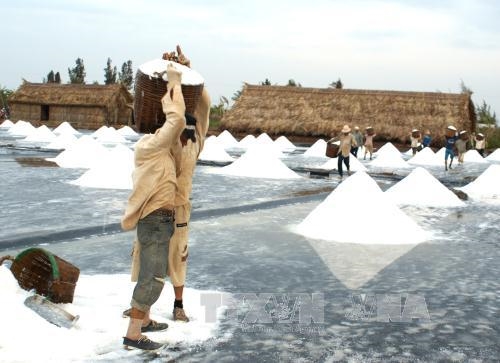 Economy
Economy

The Việt Nam Northern Food Corporation (Vinafood 1) has begun buying salt from farmers who have faced declining prices but have large inventories.
 |
| Harvesting salt in the Cửu Long (Mekong) Delta province of Bạc Liêu. — VNA/VNS Photo Huỳnh Sử |
HCM CITY — The Việt Nam Northern Food Corporation (Vinafood 1) has begun buying salt from farmers who have faced declining prices but have large inventories.
The Ministry of Agriculture and Rural Development last month told Vinafood 1, which is a State-owned corporation, to buy the salt from farmers, until the end of September.
Farmers in Ninh Thuận, Bến Tre and Bạc Liêu provinces and HCM City have the largest salt stockpiles.
Vinafood 1 is paying VNĐ600 a kilo, about VNĐ100 higher than the market price.
In the 2015-16 salt production season, farmers nationwide had a bumper salt harvest because of prolonged heat.
However, salt prices dropped dramatically and farmers were stuck with a large quantity of salt.
In the central province of Ninh Thuận, the country’s largest salt producer, many farmers have a large quantity of salt.
Farmer Trương Văn Luông in Ninh Thuận’s Ninh Hải District said his family produced 20 tonnes of salt this year, but could sell only two tonnes.
The price of salt was too low, he said, adding that if he sold the remaining salt, the money could not cover production costs.
As of mid-July, farmers in Ninh Thuận had sold salt produced by traditional methods at a price of VNĐ400,000 (US$18) a tonne, down VNĐ100,000 against the same period last year.
Farmers could only earn profits when the price of salt produced by traditional methods was above VNĐ500,000 a tonne, according to the province’s farmers.
Ninh Thuận has about 3,600ha of salt with annual output of 350,000 tonnes. Of the salt output, about 80 per cent is produced by companies and the remaining by farmers.
About 800 salt farmers in the province have produced salt for more than 10 years.
However, most farmers use a traditional method, so the salt is of low quality and brings low prices, according to Phan Quang Thựu, deputy director of the Ninh Thuận Province’s Department of Agriculture and Rural Development.
The canvas sheet method, which yields cleaner salt, is more difficult to implement because of the initial investment costs required of farrmers.
In the Cửu Long (Mekong) Delta province of Bạc Liêu, the People’s Committee has spent VNĐ400 million ($18,000) to help salt farmers build warehouses to store salt until the prices rise.
In the 2015-16 salt production season, Bạc Liêu farmers produced nearly 2,400ha of salt with total output of 175,000 tonnes.
Bạc Liêu has about 110,000 tonnes of salt in stock. —VNS




